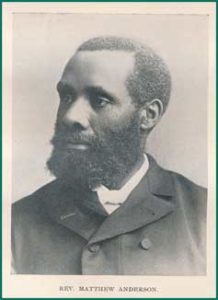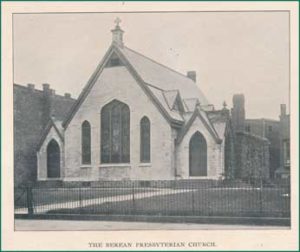
Matthew Anderson was born in Greencastle, Pennsylvania on January 25, 1845. His father was Timothy Anderson, who died in 1878 at the age of 84. Matthew was educated at Oberlin College, graduating there in 1874 and began his preparation for the ministry at the Western Theological Seminary in Pittsburgh before transferring to the Princeton Theological Seminary, where he graduated in 1877, which would have been the year before the death of Charles Hodge. Upon graduation Anderson began his ministerial career as stated supply for the Temple Street Congregational Church in New Haven, CT.
Then in June of 1878 he was ordained as an evangelist by the Presbytery of Carlisle (PCUSA), serving as stated supply of the Gloucester Mission in Philadelphia, 1879-80. It may have been around this time that he married, for it was common in that era for pastors to put off marriage until employed by a church. And Anderson chose well, marrying a woman of great character and accomplishment, Caroline V. Still, the daughter of noted abolitionist William Still.
Under Rev. Anderson’s leadership, the mission work was particularized as the Berean Presbyterian Church and he continued as pastor of this work from 1880 until his death on January 11, 1928. The church continues its ministry to this day. Honors conferred upon him during his lifetime included the Doctor of Divinity degree confered upon him in 1904 by Lincoln University.
The following is a brief account of the birthday celebration given in honor of Rev. Anderson in 1927, roughly one year before his death. This account appeared in a Philadelphia based Presbyterian newspaper.

[excerpted from THE PRESBYTERIAN, 97.6 (10 Feb. 1927): 21, 24.
For three consecutive years, the congregation of the Berean church have taken it upon their willing hearts to honor the natal day of their pastor, Rev. Matthew Anderson, D.D.
Accordingly, on January 25, a host of friends gathered around the festive board to do him honor while the young people at their table showed their whole-hearted enthusiasm. One birthday cake made a journey from the Canal Zone from Dr. Anderson’s daughter, and was received in excellent condition. The happy faces, light hearts and general atmosphere of congeniality which pervaded served to while away the perfect evening very rapidly. Mr. Arthur Faucet, a young man who grew up in the Sabbath-school, and as an elder in the church, as well as the youngest principal of a public school in Philadelphia, was toastmaster. Speeches were made by Miss Arabella Carter, a Quaker friend of Dr. Anderson; Mr. J.C. Calloway; Mr. H.H. Thomas, a neighborhood guest; Miss H. Frances Jones, president of the W.C.T.U.; Mrs. Lottie A. Smith; Mr. William H. Brown, of the board of directors of Berean Building and Loan Association; Rev. George F. Ellison, of Reeve Memorial; Rev. Charles S. Freeman, pastor of the First African church; Dean L.B. Moore, and Mr. L.W. Underhill, Jr.

It was for Dean Moore to make a suggestion that surprised every one, and that was that the heavy burdens of the educational work which Dr. Anderson had started needed sympathy, and at his timely and appropriate request, over $100 was raised, which Dr. Anderson accepted, not as a birthday gift, but in his usual sacrificing spirit, as a gift to help with the current expenses of the Berean School. Singular enough was it that the gist of every speech made during the evening pointed to the fact that Dr. Anderson’s seventy-nine years had been spent in arduous labor for his people, and that he had been diligently, persistently and untiringly at one thing all this time.
The evening was also enhanced by the presence of the Reeve Memorial Quartette, whose splendid singing of spirituals calls forth many encores. Dr. Anderson in his remarks said that nothing gave him greater happiness than to be in good health, to be able to stand before them without pain, to be able to give back the smiles that greeted him, and to hope for more years of robust health and strength to carry on his work for humanity, which he felt was in no wise finished.
Words to Live By:
In his autobiography, Rev. Anderson relates ten personal rules or principles that regulated all his ministry. Among these, perhaps the most notable was his sixth principle:
“6. That we be guided and regulated by the great and immortal principles of divine truth, rather than by sentiment, which knows no creed, race or color, and which regards all men alike redeemed by one common Lord and Master, Jesus Christ. That while by the accidents of birth and the unholy sentiment of the country, our labors are confined principally to the people of the colored race, we should nevertheless regard ourselves, ministers of Christ, as embracing a wider sphere of labor, since in God’s sight there is neither Jew nor Greek, barbarian nor Scythian, bond nor free, but all related by ties of consanguinity, having sprung from common parents.”
Image source: All three photographs are found in the volume Presbyterianism : It’s Relation to the Negro, by the Rev. Matthew Anderson. Philadelphia, PA: John McGill White & Co., 1897. To view digital edition, click the embedded link. Pictured are Rev. Matthew Anderson [1848-1928]; the Berean Presbyterian Church, Philadelphia, PA; and Dr. Caroline V. Anderson, M.D., wife of the Rev. Matthew Anderson and daughter of the noted African American abolitionist William Still.
